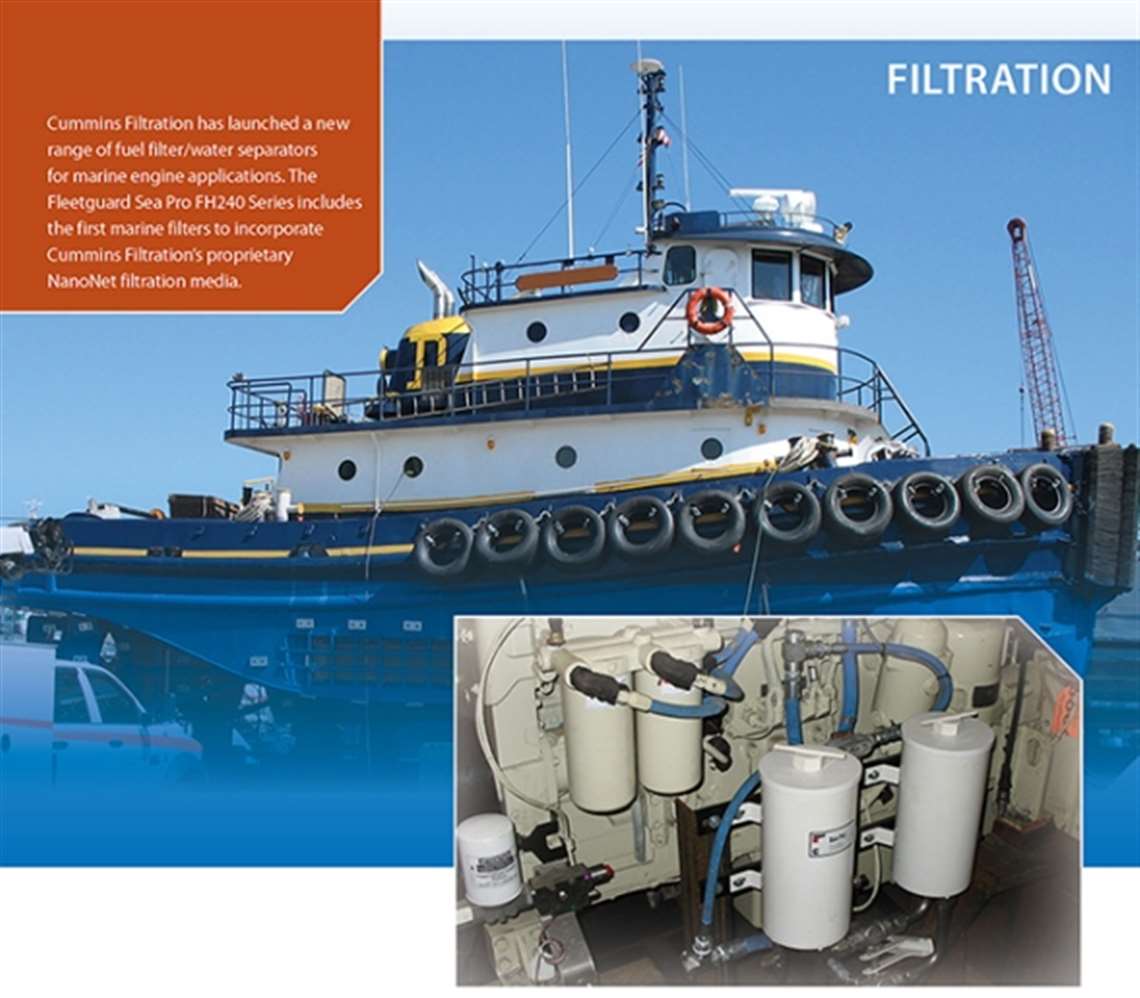NanoNet Goes To Sea
01 April 2016

Cummins Filtration launches new marine fuel filter/water separator using proprietary nanotechnology based media

Cummins Filtration, the business unit of Cummins Inc. that specializes in filtration technology for diesel engines, transmissions and industrial applications, has developed a new fuel filter/water separator for marine applications that incorporates nanotechnology in the filtration media to deliver an enhanced level of efficiency and particulate removal for commercial marine engines.
Targeted toward engines 19 L and larger, the new Fleetguard Sea Pro FH240 Series filters are the first marine product to utilize Cummins Filtration’s proprietary NanoNet media. Initially used in on-highway diesel engine applications, Cummins has gradually broadened the applications to include off-highway and industrial engines and now marine.
According to Cummins Filtration, the new units incorporate 67% more media area and five times more water-holding capacity than previous Sea Pro systems, while still providing reduced flow restriction.
“That’s the media technology,” said Cindy Hawkins, Global Fuel product manager at Cummins Filtration. “It’s basically the best protection you can get for your marine engine because the media offers very efficient water separation and captures and retains particles or contaminants better than any other media in the market place today.”
The Sea Pro NanoNet filtration products meet original equipment manufacturer (OEM) efficiency requirements, measured in terms of Beta ratio, the company said. Beta ratio for the new Sea Pro FH240 Series is greater than β1000 at 7 microns c, compared to the earlier FH234 series with a Beta ratio of β250 at 7 microns c.
Developed over several years of extensive real-world field-testing, the nanofiber filter media is engineered to capture contaminants from the fuel system such as water, organic materials (wax and bitumen-like asphaltenes) and inorganic materials (dirt and engine wear metals) from the fuel system.
The capability is especially important in diesel engines equipped with high-pressure common rail fuel systems (HPCR) that often operate at pressures exceeding 2000 bar. High levels of fuel filtration are a necessity to assure proper engine operation and reduce potential damage to precision fuel injection components.
Cummins Filtration said the development of NanoNet also focused particularly on real world engine issues, specifically flow surge and vibration. Flow surge is caused at engine startup and during increases in engine speed (acceleration). This leads to significant increases in fuel flow rate. Cummins Filtration said its research indicated that injector pilot valve wear can increase dramatically because of fuel flow surges that take place at engine startup if the fuel does not meet cleanliness standards.
 Engine vibration can also adversely affect fuel filtration performance by dislodging and re-entraining contaminants previously captured within the fuel filters back into the system. Vibration can also lead to a decrease in fuel filtration efficiency, the company said.
Engine vibration can also adversely affect fuel filtration performance by dislodging and re-entraining contaminants previously captured within the fuel filters back into the system. Vibration can also lead to a decrease in fuel filtration efficiency, the company said.
Cummins Filtration said its testing showed that NanoNet filtration technology delivered an extremely high degree of particulate removal and exhibited between seven and 13 times greater particle retention during engine vibration and fuel surge than conventional filters.
The Sea Pro FH240 is available in several configurations — single and duplex in short and tall sizes — which allows the system to be customized for specific marine engine applications (see related chart). It is compatible for use with No. 1 and No. 2 diesel fuel, B20 biodiesel, kerosene and JP8.
The media and valves are housed within a steel housing with an anodized coating to withstand the most rigorous shipboard conditions, the company said.
Maintenance is designed to be simple, with a quick-acting drain for water and contaminant removal. In addition, a low-restriction check valve eliminates the loss of prime when draining or changing the filter, the company said, and a water-in-fuel (WIF) sensor kit is available as an option.
“It takes less time to have a service event,” Hawkins said. “It’s easy to remove and replace the element and if you have a duplex, you can do it while the engine is still running. You don’t have to shut your engine off — you can simply use the duplexing capability to shut one side off, change it, then shut the other side off and change that one. There’s no downtime; the equipment can still be running.”
Standard service intervals typically exceed 500 hours, doubling the life of the previous generation, the company said, and in certain customer field trials, service intervals beyond 1000 hours were noted.
The new Sea Pro FH240 Series meets the latest American Bureau of Shipping (ABS), Bureau Veritas and Japanese Class NK certifications, Hawkins said.
“When we saw the new requirements from the certification agencies calling for new and improved units, that made it the obvious choice to use the NanoNet technology,” Hawkins said. “It meets the certification requirements, it provides extra protection for the engine from contaminants and water and it provides a best-in-class solution for our customers.”
POWER SOURCING GUIDE
The trusted reference and buyer’s guide for 83 years
The original “desktop search engine,” guiding nearly 10,000 users in more than 90 countries it is the primary reference for specifications and details on all the components that go into engine systems.
Visit Now
STAY CONNECTED




Receive the information you need when you need it through our world-leading magazines, newsletters and daily briefings.
CONNECT WITH THE TEAM












